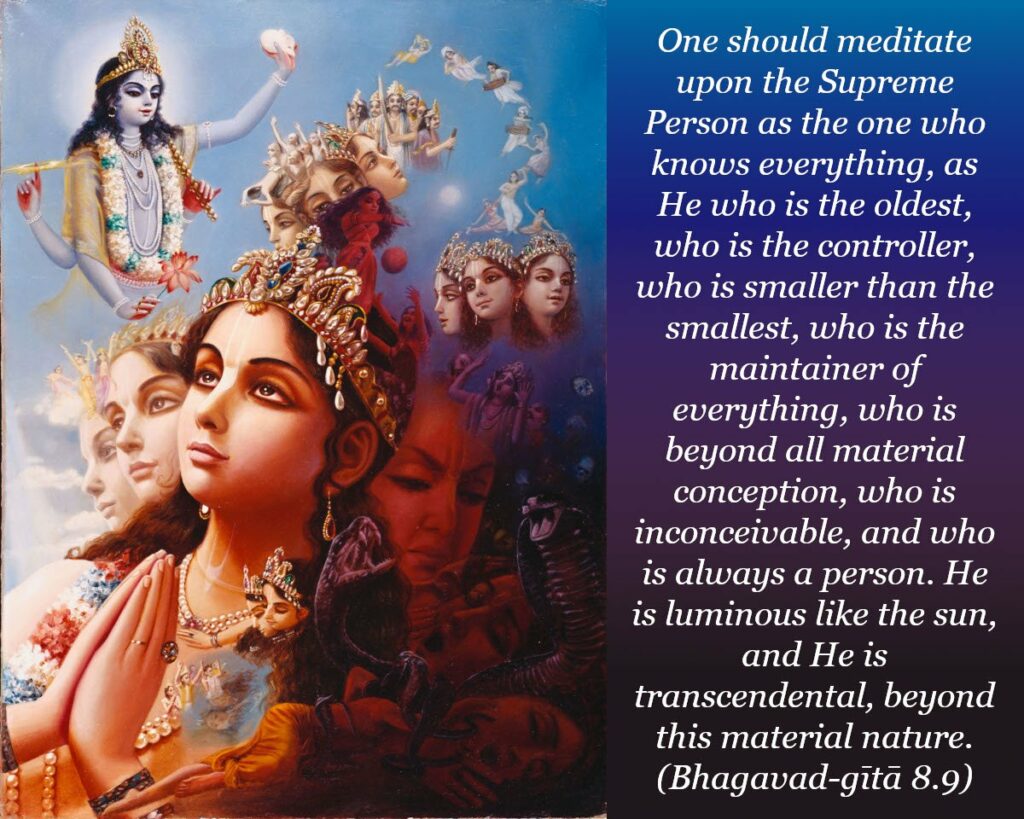कविं पुराणमनुशासितार
मणोरणीयांसमनुस्मरेद्य: |
सर्वस्य धातारमचिन्त्यरूप
मादित्यवर्णं तमस: परस्तात् || 9||
प्रयाणकाले मनसाचलेन
भक्त्या युक्तो योगबलेन चैव |
भ्रुवोर्मध्ये प्राणमावेश्य सम्यक्
स तं परं पुरुषमुपैति दिव्यम् || 10||
kaviṁ purāṇam anuśhāsitāram
aṇor aṇīyānsam anusmared yaḥ
sarvasya dhātāram achintya-rūpam
āditya-varṇaṁ tamasaḥ parastāt
prayāṇa-kāle manasāchalena
bhaktyā yukto yoga-balena chaiva
bhruvor madhye prāṇam āveśhya samyak
sa taṁ paraṁ puruṣham upaiti divyam
kavim—poet; purāṇam—ancient; anuśhāsitāram—the Controller; aṇoḥ—than the atom; aṇīyānsam—smaller; anusmaret—always remembers; yaḥ—who; sarvasya—of everything; dhātāram—the support; achintya—inconceivable; rūpam—divine form; āditya-varṇam—effulgent like the sun; tamasaḥ—to the darkness of ignorance; parastāt—beyond; prayāṇa-kāle—at the time of death; manasā—mind; achalena—steadily; bhaktyā—remembering with great devotion; yuktaḥ—united; yoga-balena—through the power of yog; cha—and; eva—certainly; bhruvoḥ—the two eyebrows; madhye—between; prāṇam—life-airs; āveśhya—fixing; samyak—completely; saḥ—he; tam—him; param puruṣham—the Supreme Divine Lord; upaiti—attains; divyam—divine
Translation:
Who, at the time of leaving the body, by the power of yogic practice, fixes the vital breath in the centre of the brows, and thinks continuously of the Omniscient, the Ancient, the controller of all the worlds, subtler than atom, supporter of all, of inconceivable form, self illumined like the sun, beyond darkness – he attains the self-illumined Paramatma.
Commentary:
The Lord describes the different aspects of Paramatma and points the way of meditation. It is necessary to know the attributes of the Supreme for strengthening and confirming one’s faith in Him. Naturally, people can only think of that about which something is known. So in the 9th verse, eight attributes of the Supreme are mentioned.
- Kavi: The Lord is Omniscient, the poet of poets; to know Him is the highest poetic experience.
- Purāṇam: He is the Ancient, without a beginning. All other beings have a beginning and so they have an end also. Paramatma is Eternal.
- Anuśhāsitāram: He is the Lord and Controller of all the worlds. What should be one’s devotion to Him compared with the respect that one has for small princes of earthly states!
- Aṇoraṇīyān: The Upanishads declare that he is smaller than the atom and bigger than the biggest. Therefore knowing that the Lord is present in everything big and small, one should have a devotional attitude toward everything in the world.
- Sarvasya Dhātā: God is the source of sustenance. Similar to an ocean that sustains the waves and its vast marine ecology. God is the support for His entire creation.
- Achintya rūpa: He is beyond the senses and cannot be comprehended by the mind. But the purified mind, by contemplation, becomes one with Him, even as the rivers when they merge with the sea lose their separateness and become one with the ocean. and The purified mind knows Him by being united with Him. There is no other way to know the Lord.
- Āditya varṇa: He is Light. It is his Light that illumines the sun and everything else.
- Tamasaḥ Parastāt: He is beyond the darkness of ignorance, beyond Maya.
Man when he leaves the body, should contemplate Paramatma by understanding Him through these eight attributes. Here death is described as travel to a distant place (Prayana). Just as man secures all necessary things before he starts on travel, even so he should provide himself with all the best qualities before he leaves the body.
Thus during the last moments also man should contemplate Paramatma with Bhakti and Yoga. Both are essential for Dhyana. Bhakti is necessary to destroy egoism and secure the grace of God. Yoga is necessary to restrain the senses and mind for the purpose of meditating on the Supreme. Also, the mind should be immovable and the meditation continuous.
The reward for this is absolute freedom-Moksha.
Question: What attributes of Paramatma are mentioned here?
Answer: He is Omniscient, ancient, the Controller of all the worlds, subtler than atom, supporter of all, inconceivable in form, self-illuminating like the Sun, shining beyond all darkness.
Question: How should one meditate on Him at the time of leaving the body?
Answer: With steady mind, with devotion, and with yogic power holding the vital breath in the centre of the brows, one should meditate.
Question: What is the result?
Answer: He attains the state of Paramatma.
Question: So what is the way to attain Him?
Answer: Devotion and Yoga.
Bhagavad Gita: Chapter 8 🔻 (28 Verses)

